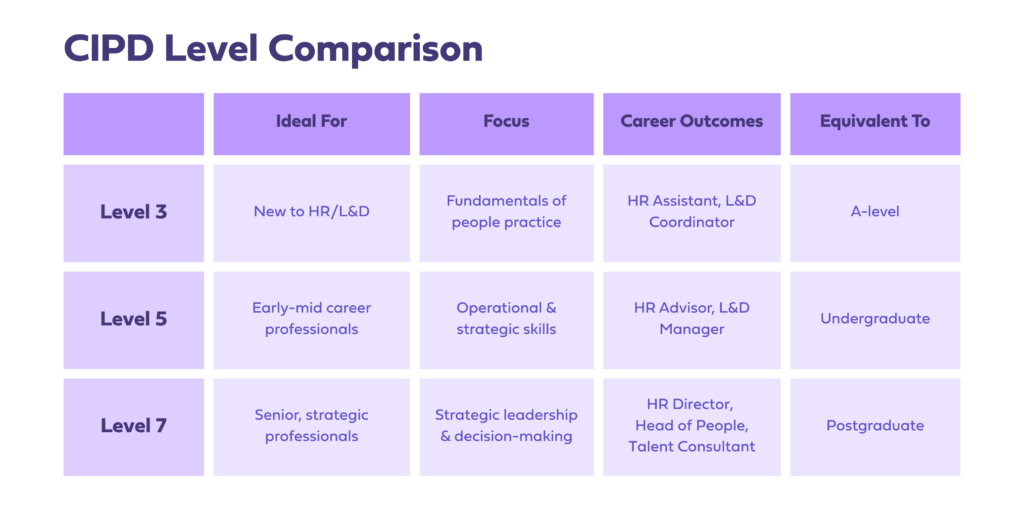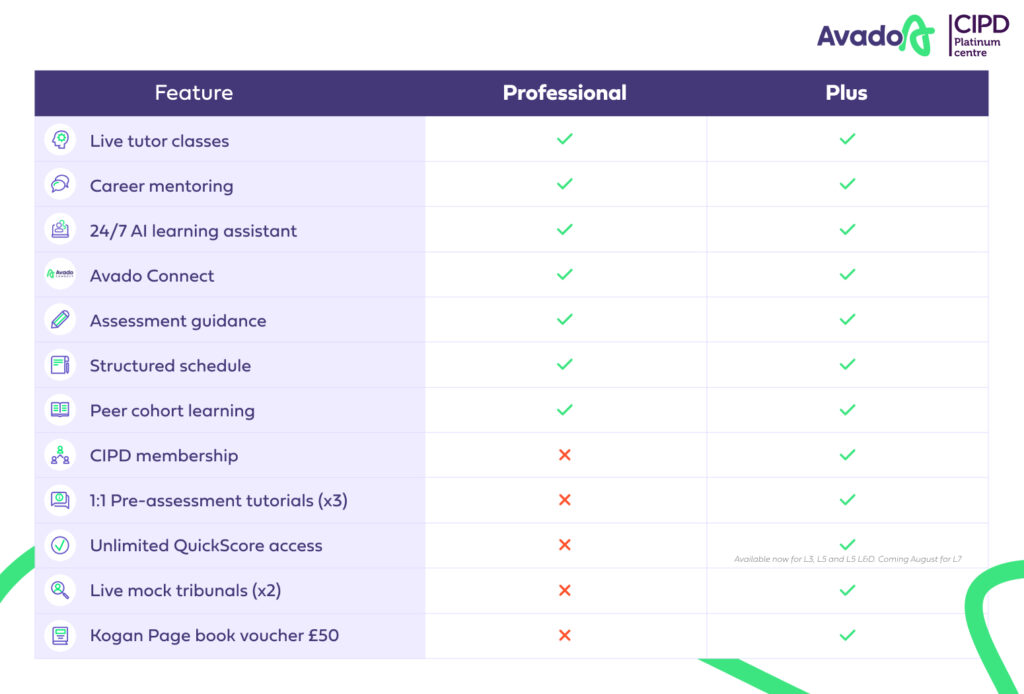If you’re looking to build or progress a career in Human Resources (HR) or Learning and Development (L&D), a CIPD qualification can open the door to new opportunities. But with three main levels—Level 3, Level 5 and Level 7—it’s important to choose the right starting point.
In this guide, we’ll explain what each level covers, who it’s suitable for, and how to match your current experience and career goals to the right CIPD course.
What is a CIPD qualification?
A CIPD qualification is a signal to potential employers that you take your profession seriously, and are committed to constantly growing. It lets them know that you’re someone worth investing time and money into.
This is because the Chartered Institute of Personnel and Development (CIPD) is a hugely respected entity in the worlds of HR and L&D. It is a truly international community, with more than 160,300 members across the “UK, Asia and the Middle East.”
Explore: HR Career Path Guide: How to Get Started Even with No Experience and Degree
What are the different CIPD qualification levels?
Before choosing a CIPD course, familiarize yourself with its offerings.
The CIPD provides various qualifications for professionals at different career stages. These qualifications are based on the CIPD Profession Map, a framework model that highlights the key areas of HR or L&D, such as personal effectiveness, business behaviours, and technical proficiency.
They are designed to enhance individuals’ skills, knowledge, and confidence in their field. From foundation-level certificates to advanced-level diplomas, each qualification is tailored to meet the needs of the modern HR and L&D professional.

CIPD Level 3 – Foundation Certificate in People Practice
Who it’s for
Individuals new to HR or L&D, entry-level professionals, career changers, or those with no formal experience.
Syllabus overview:
- Business, culture and change in context
- Principles of analytics
- Core behaviours for people professionals
- Essentials of people practice
Career outcomes
HR Administrator, HR Assistant, L&D Coordinator.
What you’ll learn
This course gives you a solid grounding in the people profession, from recruitment and onboarding to employee relations and basic L&D.
Equivalent to
A-level qualification or apprenticeship standard.
CIPD Level 5 – Associate Diploma in People Management
Who it’s for
HR professionals with some experience or a related degree who want to move into mid-level roles such as HR Advisor or Business Partner.
Syllabus overview
- Organisational performance and culture in practice
- Evidence-based practice
- Professional behaviours and valuing people
- Employment relationship management
- Talent management and workforce planning
- Reward for performance and contribution
- Specialist employment law
- Advances in digital learning and development
- People Management in an International Context
What you’ll learn
You’ll build the knowledge and skills to manage people functions strategically. This includes workforce planning, reward, employment law, and leadership.
Career outcomes
HR Advisor, People Manager, HR Business Partner, Employee Relations Lead
Equivalent to
Undergraduate degree
CIPD Level 5 – Associate Diploma in Organisational Learning & Development (L&D)
Who it’s for
L&D professionals or managers looking to take a more strategic role in driving learning within organisations.
Syllabus overview
- Organisational performance and culture in practice
- Evidence-based practice
- Professional behaviours and valuing people
- Supporting self-directed and social learning
- Learning and development design to create value
- Facilitate personalised and performance focused learning
- Specialist employment law
- Advances in digital learning and development
- People Management in an International Context
What you’ll learn
This course equips you to lead learning strategies that align with business goals. You’ll gain skills in learning design, facilitation, digital tools, and performance improvement.
Career outcomes
L&D Manager, Learning Partner, Talent Development Manager, Organisational Development Advisor
Equivalent to
Undergraduate degree
CIPD Level 7 – Advanced Diploma in Strategic People Management
Who it’s for
Senior HR or L&D professionals aiming to work at director level or as consultants in strategic roles.
Syllabus overview
- Work and working lives in a changing business environment
- People management and development strategies for performance
- Personal effectiveness, ethics and business acumen
- Business research in people practice
- Strategic employment relations
- Resourcing and talent management to sustain success
- Advanced employment law in practice
- Wellbeing at work
What you’ll learn
This qualification prepares you to lead at the highest level, with advanced knowledge in organisational development, ethics, strategic planning, and leadership.
Career outcomes
HR Director, Head of People, Talent Consultant, Senior L&D Leader
Equivalent to
Postgraduate or Master’s degree
Explore: How to Choose the Best CIPD Provider in 2025: What to Look For
Introducing CIPD Plus – Only at Avado
All Avado learners now have the option to upgrade to CIPD Plus — a premium learning experience designed to boost assessment performance and real-world HR readiness. It includes:

How to Choose the Right CIPD Level for Your Career Stage
Choosing the right CIPD qualification depends on your experience and career goals:
Just starting in HR or L&D?
Choose Level 3 to build foundational knowledge.
Already have some HR/L&D experience or a business degree?
Go for Level 5 to advance into management or strategic roles.
In a leadership position or aiming for board-level impact?
Choose Level 7 for strategic expertise and credibility.
Still unsure? Experience matters more than academic background. Our advisors can help you assess where to start. Book a call back here
Frequently Asked Questions
Can I start at Level 5 or 7 without doing Level 3?
Yes, if you have relevant work experience or prior education. You do not need to complete each level in order.
Do I need a degree to take Level 5 or Level 7?
No. Many learners progress based on their workplace experience rather than academic qualifications.
Which CIPD level is most popular?
CIPD Level 5 is the most common starting point for professionals already in the industry looking to move up.

 5 min read
5 min read 



